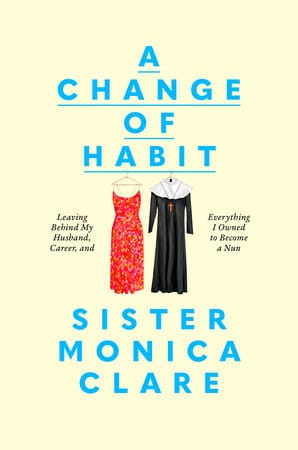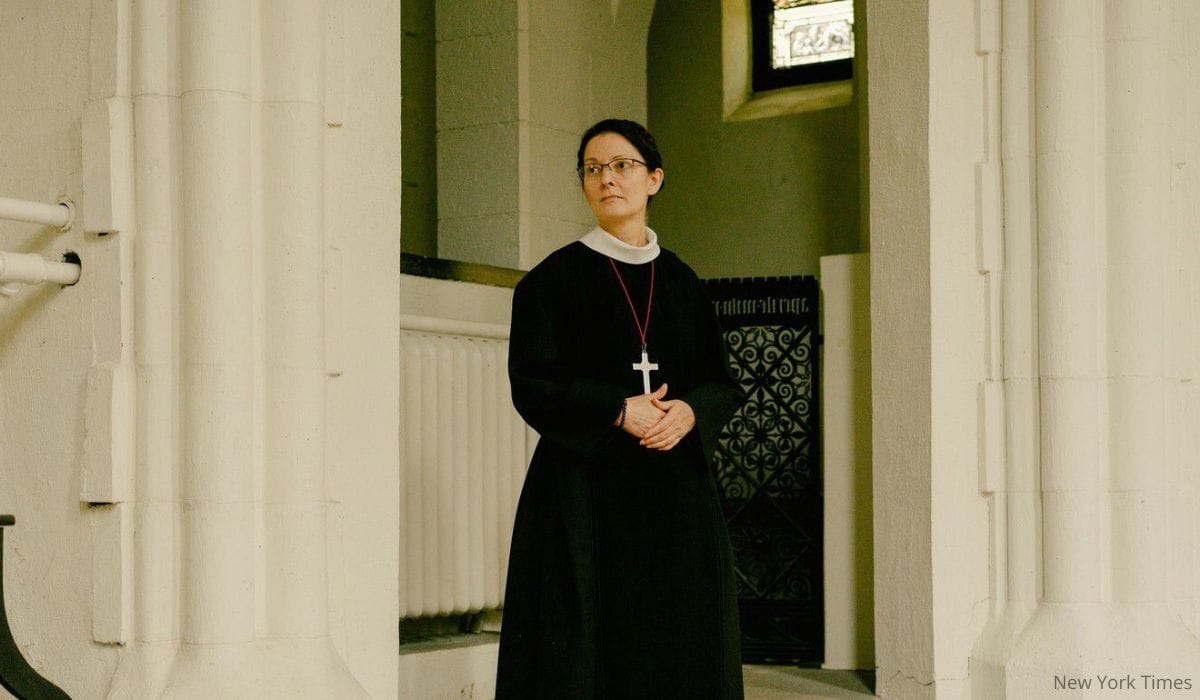Sister Monica Clare Left an Unfulfilling Career and Marriage for the Convent. Her Story Is a Compass for Finding Your Truth
One thing becomes clear when talking with Sister Monica Clare: she is a rare mix of self-aware, kind, and strong. The Episcopal nun and a spiritual advisor emanates peace and groundedness (with a good dose of humor). But this truth came from hard work.
Before becoming a nun, Sister Monica lived a life filled with conventional successes. She attended acting school at NYU, performed comedy with The Groundlings in Hollywood, worked in film advertising, and got married. She was always doing doing doing— but nothing felt quite right. All the while, she dreamed of becoming a nun, a yearning that lived in her since she was little.
It took Sister Monica years of self-discovery and discernment—including therapy, support groups, and leaving her marriage and all the hustling—to face the truth that a different path called her. And when she finally took that path, she found herself, and her community and peace.
Her new memoir, A Change of Habit: Leaving Behind My Husband, Career, and Everything I Owned to Become a Nun, brings her story to light. Sister Monica offers readers a soulful guide to resisting the prescribed ideals, listening to our hearts, and trusting that in this life, every one of us deserves to find the place where we can truly be ourselves.
A CONVERSATION WITH SISTER MONICA CLARE
You write how you never felt like you belonged and that you spent "a lifetime passing for someone else." What comes up for you now when you reflect on all that?
When I was living a life according to the checklist and according to everybody's idea of what I should be and who I should be, I felt so depressed and miserable. And I thought that I would be even more depressed and miserable if I became my authentic self. I thought nobody would like me and I wouldn't have any measurable success by cultural standards. I had been told that once you start living as your authentic self, you'll find a lot of joy and purpose, but I didn't believe it.
Then, when I finally came out of the closet as a nun, as I call it, the population of my life started to change. I started hanging out with different people. I started gaining self-confidence for the first time. And I found joy. I say to people that if you feel inadequate, like you're not enough, or you're too much, or you're falling short, you might be hanging out with the wrong people. It's been wonderful to attract the right people into my life. I believe a lot of women can relate to that.
Will you tell us more?
There's still so much pressure on women to conform. Of course, we've made so much progress, but there is still a message that women are here to marry and have children, and if you don't, then you've failed. And I wish we could get rid of that. We have got to work together. Society tries to pit us against each other. I take inspiration from the women's movement and from the Civil Rights movement over the centuries, where they had setbacks, but those were part of it, and they would continue to go forward together.
Speaking of setbacks, a theme throughout your book is one of failure. You write about how you were a "failed" TV writer, a failed stand-up comedian, and in a failed marriage. How do you view those quote-unquote failures now that you're on the other side of them?
When I started doing spiritual direction, I had a lot of clients who talked about being a failure. They told me they flunked out of college or they had a relationship that didn't work out. And when I started giving them advice, I realized it was also me giving myself advice. I told them how to think about it not as a failure but as I tried that, and it wasn't for me. So, I tried something else. Instead of trying to measure your success in terms of productivity and numbers and career success, try to think of it as you're trying things until you find what works for you. I think that softens it quite a bit. Because I'm an overachiever, and to have failed at so many things really bothered me until I started giving other people that advice and learned it for myself.
The massive changes you made in your life came later in your life, when you were in your forties. For someone who feels like they are on the wrong path or are lost, no matter their age, what counsel do you have to help them see the light?
For me, it is always helpful to always have discernment in my mind. As a spiritual person, discernment means bringing God and other people into your decision-making. When I was on my own, I was just spinning. I would gripe with friends, but I was just talking in circles. When I finally got help and started to go to Al-Anon and listen to people's stories and then to therapy, that is when I started the real discernment of finding out who I really am. And that is when I started to gain tools that helped me discern better.
One of the hardest things for people is decision-making. I know people who've been in bad marriages for decades and they can't make the decision to leave, and I try to encourage them to find support groups or places where you can share your burden with others and to help you with discernment. I also have a lot of friends who've been in bad work situations for years, and they talk to their friends about it, but their friends don't really have solutions. They'll just commiserate and say, 'You'll figure it out.' But when you get treatment or access a support group, it really helps you zero in on what's actually wrong.
Many people think they can't access treatment; they may say they're too broke, which is a huge roadblock. I always remind people that there are therapists who do sliding scales; if there's a psychology department at the local college, they likely have a sliding scale therapist. Support groups like Al-Anon are free, and Al-Anon was one of the best quote-unquote therapy sessions I've ever had in my entire life. So, I try to encourage people to find ways around the expense problem and to seek support. I did it while I was broke, and it changed my life completely.
Before you became a nun, you were hungry for community and a sense of belonging, a yearning countless people unfortunately have today, but you were also hyper-independent. What did you learn from that tension?
I was one of those people who, if I went to Ikea and bought a piece of furniture, I would rather set myself on fire than ask somebody to help me carry it into my apartment! I would take it piece by piece out of my trunk because I was so hyper-independent. And then, I realized that joining a religious community meant that I couldn't be solitary and independent. I had to be part of a community, and it was difficult for me to learn how to trust people, ask for help, be vulnerable around people, and show them the negative parts of myself. And with all that, I learned that people would not abandon or reject me.
This has made me think about how younger generations are living communally, not just because of the economic situation, but because they're lonely and they want to live in a community with other people. My generation, Gen X, was so hyper-independent. Our big dream was to get our own place with no roommates, and that was successful. And I see younger generations yearning to live in community, and I think it's a microcosm of society where we have to learn to live together and connect, and we really want to.
I tell people to first find their tribe because we all have one. We all have our people who know us and appreciate us. But many people are in situations where they haven't found their tribe yet. I've recently discovered that writers are people I feel incredibly comfortable around; they seem to get me, and I never knew that before. I also feel very safe around religious folks. But again, a lot of people haven't found their people yet, and that does not mean anything is wrong with you. You will find them.
Sister Monica, now that you're on the other side of such massive life changes and you've found peace in the convent, what do you continue to learn about yourself?
I'm learning to be brave, which was never one of my strong points before. Being brave wasn't really something I did, but I've learned that things like leaving my hometown to go to New York City for college and moving to Los Angeles are brave. I didn't realize I was doing courageous things. And I've only started to realize in my fifties that I have it in me, so now I draw on that courageous part of myself that I didn't think existed. Even writing this book, the old shy me would have been like, 'No, thank you!' But now I see that going outside my comfort zone is getting easier and easier.
The one thing God has always done for me is anytime I express a fear, God forces me to face that fear. In my prayer life, I kept thinking, God, why do you keep doing this? Everything I'm afraid of, you make me do it. Then I saw it was because God wanted to build my confidence. When you do scary things, you become more confident and you become stronger. I had prayed years ago to be brave, and God is answering my prayers.

Sister Monica Clare is the Sister Superior at the Community of St. John Baptist, an Episcopal convent based in New Jersey, and a spiritual counselor specializing in religious trauma, mental illness, and addiction. Before becoming a nun in 2012, she worked as a photo editor in L.A. and performed in an acoustic rock duo and an improv comedy troupe. Learn more at sistermonicaclare.com.
Please note that we may receive affiliate commissions from the sales of linked products.



